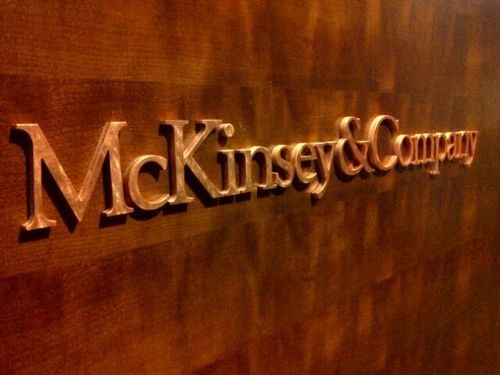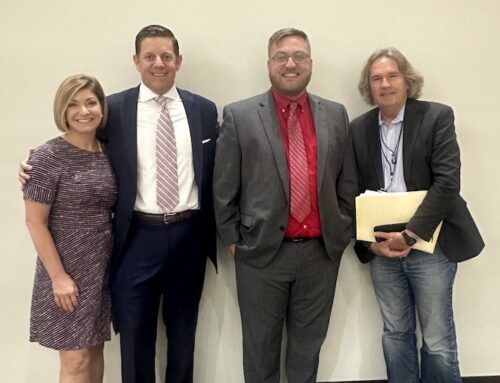Lawsuit challenges use of deliberative process privilege to keep McKinsey report secret
A Nashville citizen has sued the state for refusing to release a government efficiency report prepared by an outside consultant in connection with the state’s COVID-19 response.
 The state’s Department of Human Resources claims the analysis by McKinsey and Co. is confidential because it is subject to the “deliberative process privilege” and contains information related to “operational vulnerabilities.” The Tennessean has reported the McKinsey analysis, delivered in September 2020, cost the state $1.59 million in taxpayer dollars.
The state’s Department of Human Resources claims the analysis by McKinsey and Co. is confidential because it is subject to the “deliberative process privilege” and contains information related to “operational vulnerabilities.” The Tennessean has reported the McKinsey analysis, delivered in September 2020, cost the state $1.59 million in taxpayer dollars.
In Thomas Wesley v. Tennessee Department of Human Resources, Wesley, a state government employee, argues that the report is a public record because it was “made or received…in connection with the transaction of official business by [a] governmental entity,” which is the definition of a public record outlined in statute.
Wesley’s lawyers are Ron Harris and William Harbison II of Neal & Harwell and Wendy Liu of Public Citizen Litigation Group. Harris has won public records lawsuits against state agencies before while representing Scripps Media, Inc.’s NewsChannel 5, most recently in 2019 in a case that challenged the state’s expansive use of an “investigative exemption” to shield ordinary travel and credit card records.
History of deliberative process privilege in Tennessee
The “deliberative process privilege” is not an exemption to the Tennessee public records law defined in statute, but it has been discussed in two Court of Appeals rulings — Swift v. Campbell (2004) and Davidson v. Bredesen (2013). The lawsuit argues that McKinsey report does not meet the definition described by the Court of Appeals in those cases. In 2004, the appeals court described the privilege as “[p]rotecting the confidentiality of conversations and deliberations among high government officials” and concluded that “[w]hether the ‘deliberative process privilege’ may be invoked depends on the government official or officials involved.”
The court in 2004 cautioned that “the deliberative process privilege must be applied cautiously because it could become the exception that swallows up the rule favoring governmental openness and accountability. If governmental employees at any level could claim the privilege, Tennessee’s public records statutes and open meetings law would become little more than empty shells.”
Protecting the confidentiality of conversations and deliberations among high government officials ensures frank and open discussion and, therefore, more efficient government operations. United States v. Weber Aircraft Corp., 465 U.S. 792, 802, 104 S.Ct. 1488, 1494, 79 L.Ed.2d 814 (1984). However, the deliberative process privilege must be applied cautiously because it could become the exception that swallows up the rule favoring governmental openness and accountability. If governmental employees at any level could claim the privilege, Tennessee’s public records statutes and open meetings law would become little more than empty shells. — Tennessee Court of Appeals in Swift v. Campbell, 2004, describing deliberative process privilege
Not deliberations between ‘high government officials’
Regarding the case decided in 2013, Wesley’s lawsuit says that appeals court held that “notes from a deputy legal counsel regarding meetings and calls with high government officials were within the scope of the deliberative process privilege because they ‘reflected communications between high government officials and those who advise and assist them in the performance of their official duties,’ and the bulk of the records contained ‘no facts, only deliberations.’ ”
The McKinsey report, the lawsuit argues, does not reflect conversations or deliberations among high government officials, and is largely, if not entirely, factual and does not constitute deliberations. To back up the argument that the McKinsey report was factual in nature and not deliberative, the lawsuit referred to the terms of the contract that required McKinsey to include case studies, examples, data and reports. For example, in a statement of work, McKinsey discussed including “existing State employee remote work across State government” and “existing data and practices” on in-person services.” That, and other deliverables that were part of the contract’s statement of work, are purely factual material, not deliberative, Wesley argues in the lawsuit.
“Importantly, the contract was clear that ‘[t]he information included in the Deliverables … will not contain, nor are the Deliverables provided for the purpose of constituting or informing, policy judgments or advice,'” the lawsuit stated, quoting from the McKinsey contract.
Lawsuit: Report may be redacted, but must be released
 As to the confidentiality of state documents that describe “operational vulnerabilities,” Wesley argues in the lawsuit that the state has misapplied an exemption that is meant to cover only records involving electronic information processing systems, telecommunication systems or other communications systems of a government entity. The lawsuit refers to an opinion letter by the Open Records Counsel and the legislative record to explain that the exemption, T.C.A. 10-7-504(i)(1)(B), was intended to protect the security of the government’s technical infrastructure from computer hackers.
As to the confidentiality of state documents that describe “operational vulnerabilities,” Wesley argues in the lawsuit that the state has misapplied an exemption that is meant to cover only records involving electronic information processing systems, telecommunication systems or other communications systems of a government entity. The lawsuit refers to an opinion letter by the Open Records Counsel and the legislative record to explain that the exemption, T.C.A. 10-7-504(i)(1)(B), was intended to protect the security of the government’s technical infrastructure from computer hackers.
Even if the McKinsey report included confidential information related to the state’s technical infrastructure, the report could be redacted of specific confidential information and released, Wesley argues.
The lawsuit was filed on Dec. 17 and assigned to Chancellor Patricia Head Moskal. A date for the show cause hearing, in which the state must explain its legal reasoning for invoking a “deliberative process privilege” and the ” operational vulnerabilities” exemption to deny access to the McKinsey report, has not yet been set.
News stories on the Wesley lawsuit:
Tennessee sued for not releasing COVID report by contractor McKinsey & Co. (Jonathan Mattise and Kimberlee Kruesi of The Associated Press via The Tennessean)
State employee files public records suit over denial of COVID consultant report (Anita Wadhwani, Tennessee Lookout)
Also see: Deliberative process privilege danger to open government (2013, Knoxville News Sentinel editorial)




